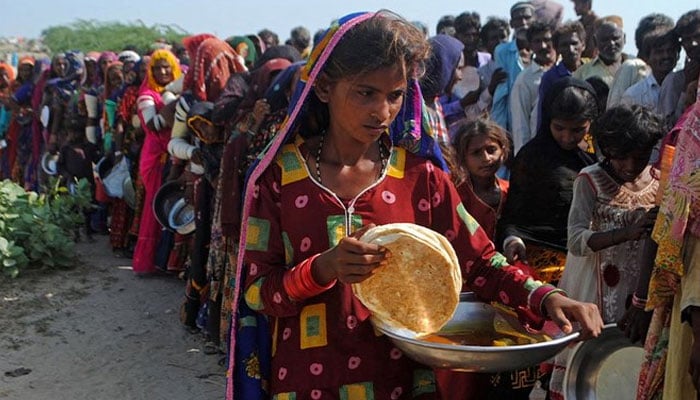Rising hunger
This was sixth consecutive annual increase in people hit with ‘high levels’ of acute food insecurity
The 2020s have, thus far, been a decade of rising hunger. According to the Global Report on Food Crises, a UN-backed report, more than 295 million people faced acute hunger last year, a new high driven by conflict along with other crises. This was the sixth consecutive annual increase in people hit with ‘high levels’ of acute food insecurity. The 295.3 million people who suffered acute hunger last year account for almost a quarter of the population in 53 of the 65 countries analysed in the report, highlighting the vast scale of the hunger problem. This was significantly higher than the 281.6 million people suffering from acute hunger in 2023. Even more alarmingly, the number of people facing famine in 2024 more than doubled from the previous year, reaching a shocking 1.9 million. Conflict and violence were the primary drivers in 20 countries and territories, where 140 million people faced acute hunger, the report found. Extreme weather was the primary factor driving hunger in 18 countries and economic shocks were the primary cause in 15 countries, impacting 155 million people. This means that war emerged as the largest cause driving hunger in 2024.
Sadly, the global hunger problem will likely only get worse as the 2020s continue to unfold and war is likely to remain one of the primary drivers. The conflicts in Ukraine, Sudan and Gaza show no signs of slowing down despite ongoing attempts at negotiating a ceasefire; the latter is only being intensified. Israeli PM Benjamin Netanyahu has only expanded the genocide in the Gaza Strip, killing at least 100 Palestinians on Friday (May 16) and displacing over 19000 in 24 hours between Thursday and Friday. Most worryingly, the strip has been under a total blockade since March, preventing aid from reaching the people of Gaza. Human Rights Watch has labelled this Israeli blockade as a tool of extermination and the entire population of the strip is now suffering from high levels of acute food insecurity, as per the UN’s Integrated Food Security Phase Classification (IPC), with an estimated 500,000 facing starvation. Now, conflicts are being compounded by aid cuts as a key risk to global food supplies, with funding to humanitarian food sectors projected to sink by up to 45 per cent. Many associate this decline with the policies of US President Donald Trump, but other countries have also reduced their contribution.
As a result, the report’s prognosis for hunger in the ongoing year remains bleak, with the abrupt termination of funding in 2025 already disrupting humanitarian operations in Afghanistan, the Democratic Republic of Congo, Ethiopia, Haiti, South Sudan, Sudan and Yemen. The number of people facing acute hunger may well see a seventh consecutive spike now. While ending the conflicts driving global hunger should be the top priority for now, especially when it comes to Gaza, the global aid cuts remain the longer-term threat. Extreme weather and economic shocks, with the latter also often being driven by climate change, will be with us even in times of peace and the former is predicted to only intensify. As such, the Global South will need more aid at a time when donors from wealthy countries, mainly in the West, are quickly disappearing. Millions of people facing starvation is a small obstacle when one must pander to voters with an unquenchable thirst for xenophobia and bigotry, it would seem. Countries like Pakistan will have to work hard now to shore up their own food supplies and ensure that their people do not go hungry.
-
 Funeral Home Owner Sentenced To 40 Years For Selling Corpses, Faking Ashes
Funeral Home Owner Sentenced To 40 Years For Selling Corpses, Faking Ashes -
 Why Is Thor Portrayed Differently In Marvel Movies?
Why Is Thor Portrayed Differently In Marvel Movies? -
 Dutch Seismologist Hints At 'surprise’ Quake In Coming Days
Dutch Seismologist Hints At 'surprise’ Quake In Coming Days -
 Australia’s Liberal-National Coalition Reunites After Brief Split Over Hate Laws
Australia’s Liberal-National Coalition Reunites After Brief Split Over Hate Laws -
 DC Director Gives Hopeful Message As Questions Raised Over 'Blue Beetle's Future
DC Director Gives Hopeful Message As Questions Raised Over 'Blue Beetle's Future -
 King Charles New Plans For Andrew In Norfolk Exposed
King Charles New Plans For Andrew In Norfolk Exposed -
 What You Need To Know About Ischemic Stroke
What You Need To Know About Ischemic Stroke -
 Shocking Reason Behind Type 2 Diabetes Revealed By Scientists
Shocking Reason Behind Type 2 Diabetes Revealed By Scientists -
 SpaceX Cleared For NASA Crew-12 Launch After Falcon 9 Review
SpaceX Cleared For NASA Crew-12 Launch After Falcon 9 Review -
 Meghan Markle Gives Old Hollywood Vibes In New Photos At Glitzy Event
Meghan Markle Gives Old Hollywood Vibes In New Photos At Glitzy Event -
 Simple 'finger Test' Unveils Lung Cancer Diagnosis
Simple 'finger Test' Unveils Lung Cancer Diagnosis -
 Groundbreaking Treatment For Sepsis Emerges In New Study
Groundbreaking Treatment For Sepsis Emerges In New Study -
 Roblox Blocked In Egypt Sparks Debate Over Child Safety And Digital Access
Roblox Blocked In Egypt Sparks Debate Over Child Safety And Digital Access -
 Savannah Guthrie Addresses Ransom Demands Made By Her Mother Nancy's Kidnappers
Savannah Guthrie Addresses Ransom Demands Made By Her Mother Nancy's Kidnappers -
 OpenAI Reportedly Working On AI-powered Earbuds As First Hardware Product
OpenAI Reportedly Working On AI-powered Earbuds As First Hardware Product -
 Andrew, Sarah Ferguson Refuse King Charles Request: 'Raising Eyebrows Inside Palace'
Andrew, Sarah Ferguson Refuse King Charles Request: 'Raising Eyebrows Inside Palace'




